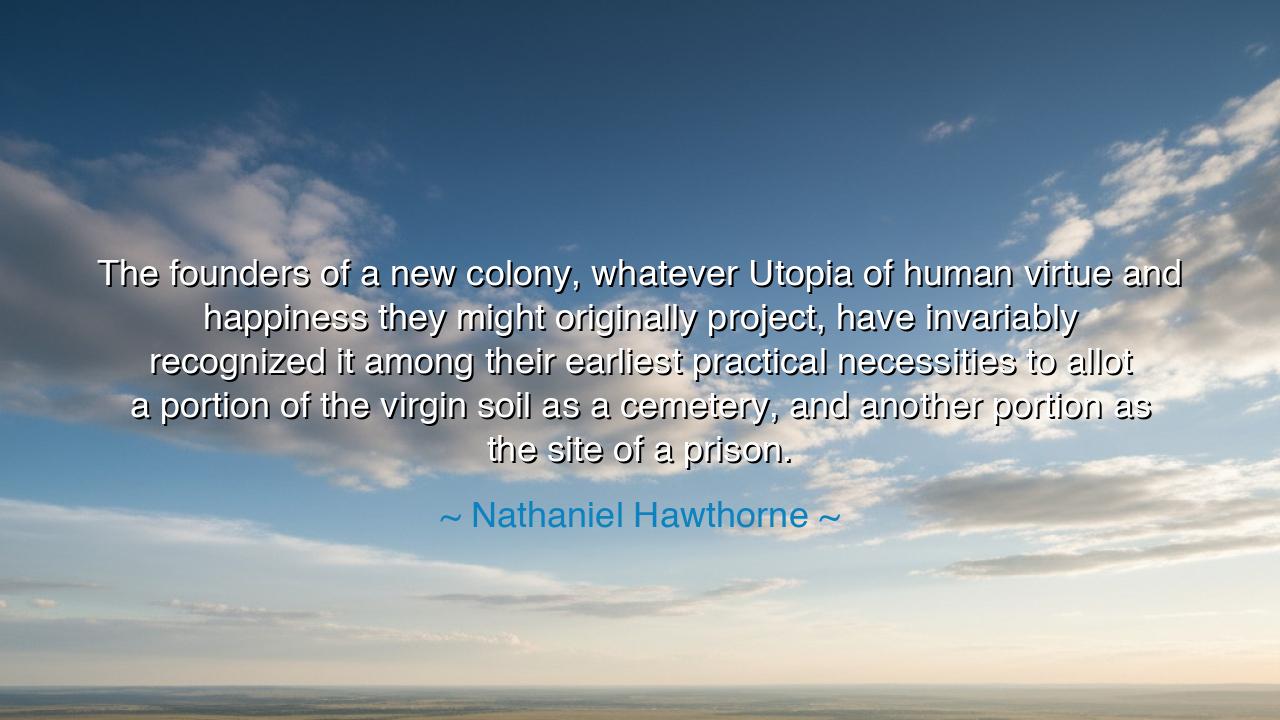
The founders of a new colony, whatever Utopia of human virtue and
The founders of a new colony, whatever Utopia of human virtue and happiness they might originally project, have invariably recognized it among their earliest practical necessities to allot a portion of the virgin soil as a cemetery, and another portion as the site of a prison.






The words of Nathaniel Hawthorne—“The founders of a new colony, whatever Utopia of human virtue and happiness they might originally project, have invariably recognized it among their earliest practical necessities to allot a portion of the virgin soil as a cemetery, and another portion as the site of a prison”—resound with the gravity of human truth. Beneath their solemn phrasing lies a timeless revelation: that human nature, no matter how noble its dreams, cannot escape the realities of death and sin. Hawthorne, writing in the opening of The Scarlet Letter, captures in this single sentence the tragic paradox of civilization—the yearning for Utopia, shadowed always by the inevitability of suffering and imperfection. Wherever man builds a new world, he must make room for both the grave and the cell, for even in beginnings, endings and transgressions walk beside him.
In the ancient spirit, these words would have been spoken as a warning to kings and lawgivers. For the ancients knew that no society, however virtuous its intent, could be purified of mortality or moral failure. The cemetery stands as the first acknowledgment that life is fleeting; the prison, that freedom is fragile. Together, they form the twin boundaries of existence—the limits of body and soul. Hawthorne’s insight is not cynical, but philosophical. He does not condemn humanity for its flaws; he simply unveils the truth that imperfection is woven into the fabric of creation. Just as the garden must be fenced to guard against decay, so must the city of man be built upon the understanding that both death and guilt are inseparable from life itself.
The origin of this reflection lies in Hawthorne’s own time, a century of Puritan legacy and moral scrutiny. The Puritans who settled in New England came to the New World with visions of righteousness and renewal. They sought to build a city upon a hill, shining with divine order. Yet, as Hawthorne observed, their first acts were to establish laws and graves—the tools of punishment and remembrance. For even as they dreamed of holiness, they knew the human heart remained divided between light and darkness. The cemetery was a concession to the fragility of flesh, the prison a safeguard against the corruption of will. Thus, in their zeal to found paradise, they were compelled to prepare for its failure.
This paradox runs through all of history. When Romulus built Rome, he shed his brother’s blood. When the Pilgrims landed on Plymouth Rock, they buried their dead before their first harvest. When revolutionaries forged republics in the name of liberty, they built prisons to contain their own citizens. Every beginning, no matter how radiant, is haunted by the shadow of the inevitable. And this, Hawthorne tells us, is not tragedy—it is the price of being human. For as long as we live in flesh, we will contend with sin; as long as we breathe, we will march toward death. The founders who understand this truth are not pessimists, but realists, builders who know that idealism without humility breeds ruin.
In this light, Hawthorne’s quote becomes not a condemnation, but a mirror of wisdom. It invites us to see that acknowledging darkness is not surrender, but strength. To plan for death is to honor life; to establish justice, even through punishment, is to preserve the hope of virtue. The cemetery and the prison are not symbols of despair, but of balance—they are humanity’s admission that perfection is not of this world, yet striving for it remains the noblest of all endeavors. The wise founder builds not for gods, but for men—with compassion for their weakness and reverence for their mortality.
Consider the example of Moses, who led his people from slavery into promise. He too dreamed of a holy nation, bound by divine law. Yet his journey began and ended with graves: the graves of the disobedient in the desert, and his own grave upon Mount Nebo, unseen by his people. And he gave them commandments, laws that both liberated and constrained. Even in his vision of freedom, there was the acknowledgment of limits. So too must every leader, every builder, every soul seeking to create something lasting, remember this: that the human condition cannot be purified by will alone—it must be guided, humbled, and forgiven.
Thus, dear listener, let this be your lesson: when you dream of a better world—whether for yourself, your family, or your people—do not deny the shadows that accompany light. Accept that every ideal must coexist with discipline, and every joy with sorrow. Build your inner city not as a perfect paradise, but as a living balance of virtue and frailty. Tend both the garden of your hopes and the walls that guard against your flaws. And when you plan the future, remember Hawthorne’s wisdom: that even in new beginnings, we must make peace with the cemetery and the prison within our souls.
For this is the eternal truth of mankind—that every vision of Utopia must be tempered with the humility of death, and every dream of virtue must be anchored in the understanding of human imperfection. To know this and still build, to see the shadow and still create the light—that is the true mark of wisdom, the courage of the founders of every age.






AAdministratorAdministrator
Welcome, honored guests. Please leave a comment, we will respond soon